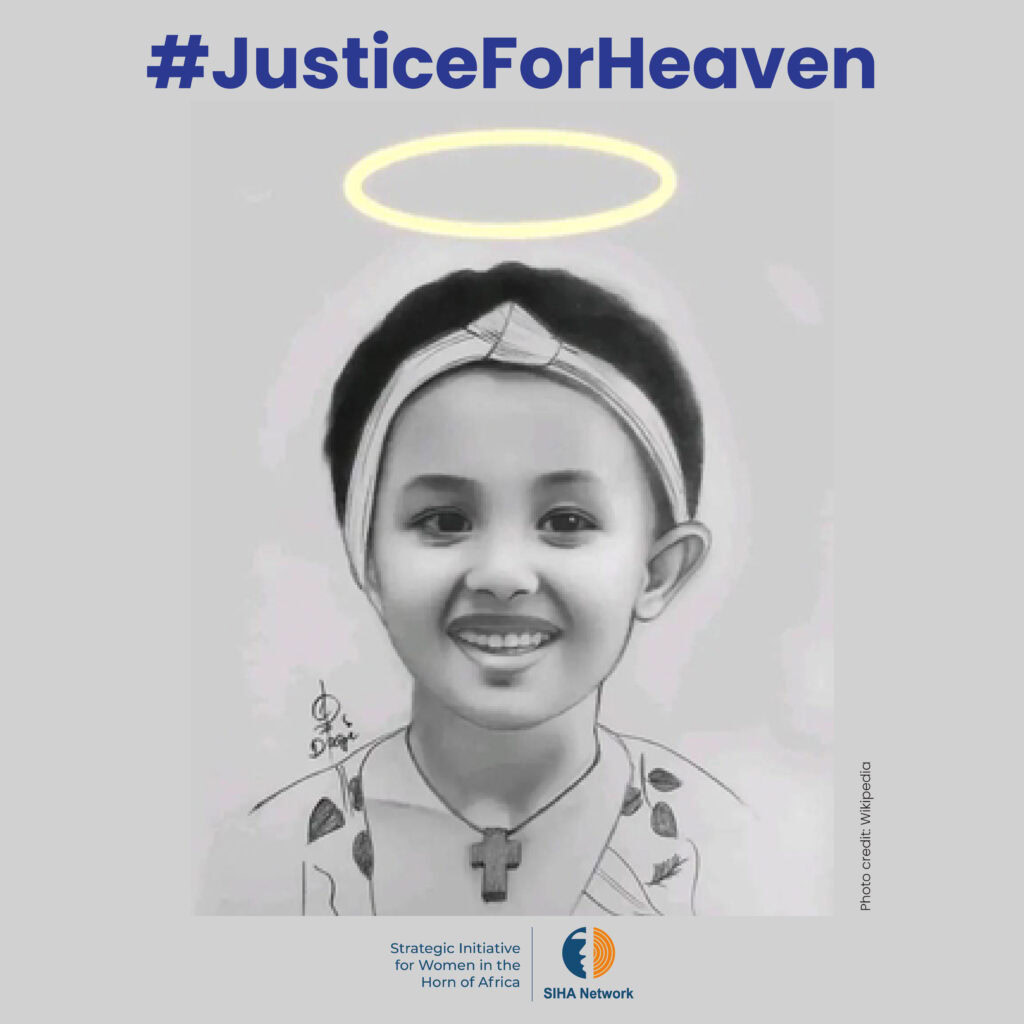Strengthening Protections and Accountability for Victims and Survivors of Gender Based Violence in Ethiopia

Gender Based Violence (GBV) remains a pressing concern in Ethiopia, as highlighted by an Online Survey conducted by SIHA Network in August 2024 with 84 respondents from diverse backgrounds. The survey, which informed the Network’s advocacy strategy for Ethiopia, revealed that 54.8% of respondents consider GBV the most critical issue for women’s rights advocates.
The recent brutal murder of seven-year-old Heaven Awet in Bahir Dar has sparked widespread outrage and demands for justice. Heaven was raped, mutilated, and killed by her mother’s landlord, who was convicted and sentenced to 25 years in prison. However, his appeal and subsequent escape have further fueled public anger. Moreover, Heaven’s mother, Sister Abekyelesh Adeba, has received death threats and been forced into hiding, underscoring the need for urgent action to address GBV and ensure accountability
The case, denounced as ‘inhumane’ by the Minister of Women and Social Affairs for the Federal Democratic Republic of Ethiopia (FDRRE), Ergogie Tesfaye (PhD), highlights the critical need for enhanced protection mechanisms for women and children in Ethiopia
The outrage surrounding Heaven’s case also exposes the entrenched, systemic issues of misogyny and gender based discrimination that pervade Ethiopian society. While Heaven’s situation is particularly heinous, it’s crucial to recognize that countless other women and girls endure violence and discrimination routinely.
Most cases reveal the inadequacy of reactionary responses, which address GBV only after it occurs, rather than preventing it proactively, thereby enabling its persistence. This necessitates a shift towards proactive, preventative measures that address GBV’s root causes by challenging deeply ingrained harmful social-cultural norms. We must also move beyond condemnation and commit to systemic change that empowers women and girls, holds perpetrators accountable, and cultivates a culture of equality and respect.
Other challenges faced by Ethiopian women
- Based on the survey, in addition to GBV, Ethiopian women face several other significant challenges:
- Economic hardships and inflation (22.6%)
- Access to education for girls and women (9.5%)
- Maternal health and reproductive rights (7.1%)
- Harmful Traditional Practices (5.9%)
- Political representation and women’s participation (4.8%)
- Workplace equality and protection (3.6%)
- Climate change and its impact on women (1.2%)
These issues are interconnected and require a comprehensive approach.
Call to Action
We urgently call on the Ethiopian government to:
- Strengthen the Criminal Justice System:
- Conduct thorough and timely investigations into GBV cases, ensuring all leads are followed and evidence is collected meticulously.
- Implement a robust system for documenting investigations and prosecutions and provide regular updates to the public.
- Review and strengthen existing laws to criminalize GBV and increase penalties for perpetrators, closing any legal loopholes.
- Reform the criminal justice system to be gender-responsive and victim-centered, prioritizing the protection, health, and socioeconomic rights of survivors.
- Enhance Law Enforcement Capacity:
- Provide comprehensive training to law enforcement officers on handling GBV cases with sensitivity and urgency.
- Implement internal audit procedures to ensure accountability and transparency in the investigation and prosecution of GBV cases.
- Promote Gender Equality and GBV Prevention:
- Develop and implement a national women’s policy and GBV prevention strategy, including educational campaigns to challenge harmful gender norms and stereotypes.
- Integrate gender equality into school curricula, media, and community programs.
- Address Economic Disparities:
- Launch programs to reduce economic hardships for women and girls, such as financial literacy training and economic empowerment initiatives.
- Engage Community & Religious Leaders:
- Collaborate with community and religious leaders to address harmful traditional practices and promote gender equality.
Signatories
- Addis Powerhouse
- Article 35
- Ethiopian Women Lawyers Association (EWLA)
- Ethiopian Women’s Development Organization (EWDO)
- Ethiopian Women with Disabilities National Association (EWDNA)
- Good Samaritan Association (GSA)
- Setaweet
- Strategic Initiative for Women in the Horn of Africa (SIHA) Network
- Tarkanfi Sustainable Development
- Timran

